In our last class, we did an exercise where we cut out letters and mounted them on a white or black background. The purpose was using white space and how much we could show the letter. Coincidentally, I got “W”.
Outlining some ideas for my typography class at Parson’s, for our book making projects.
For class, we will be creating 2 projects, which will turn into books. One is a psychogeographical map and the other is a little cooking memoir. I need to come up with idea for each.
The cooking book is to teach us about book binding and selecting type options for recipes, which can have many options. We need to pick a somewhat personal story/recipe. I think I will write about both my hatred of pot pies, as well as my love of Gordon Ramsay’s shepherd’s pie recipe, which I first made during Hurricane Sandy. This was also the week I adopted my cats, only kittens at the time, only 8-10 weeks old. At the time, the subways had been shut down, so I couldn’t go anywhere for a week. Luckily, because I was living so far north in Manhattan, there was no flooding and basically we didn’t lose any power. (In the East Village, it was another story.) I think there’s enough there to write a good story.
For the Psychogeographical Mapping…I’m drawing a blank. Some ideas:
Maybe some better ideas:
I’m leaning towards the theater idea. Now to do some write-ups.
More letters for my A-Z project, from my Typography course at Parsons.
Before I forget, here are some new letters I’ve taken photos of.
A continuation from: http://alliwalk.com/blog/2019/02/progress-on-found-alphabet-miniature-accordion-book-typography-i/
An ongoing assignment for my typography class is a title page design, for book. I chose ‘1984’, by George Orwell, for my first book.
For Typography 1, one of our ongoing assignments is the creation of title pages for a book. Our book choices are limited to the following, with no art or illustrations allowed:
We’ve gone through 1 assignment, and we will be presenting an update to the previous assignment and will be adding another book. My first book choice was 1984. Here are some designs.
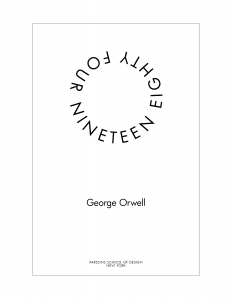
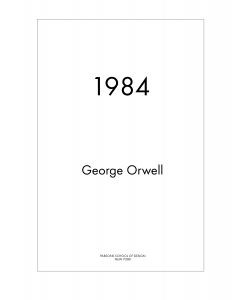
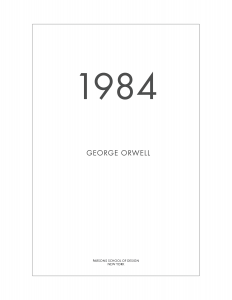
Although the last one captures, all the feedback, it’s not very interesting. Maybe that’s as it should be. I went to Barnes & Noble and saw that many title pages were fairly simple; many followed the style from the cover.
Also, at the time I created this, I thought we were limited to only using the fonts we are going to study in the class which includes Futura. That’s not the case, so in my updates, I found other fonts that I thought suited the title better.
As of now, I chose 2 fonts that I thought were closer to the feeling of the book. Modern yet restrictive. I chose Bebas Neue and Bauhaus 93 with Futura as my fonts.
Although I created a bit of a custom version of the numbers, 1984, in Bauhaus 93, to crop the ‘4’ slightly, I prefer the longer ‘nineteen eighty-four’, which I saw in a few examples of the book. It just seemed more polished and finished. I’m undecided if I will use a version with extra space between the title and the author. The publisher is still in Futura.
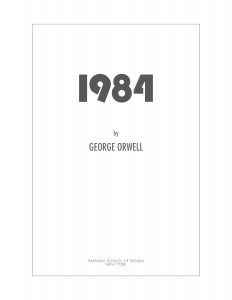
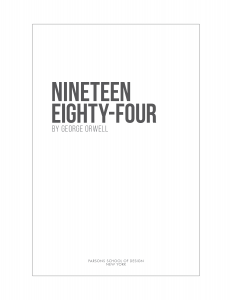
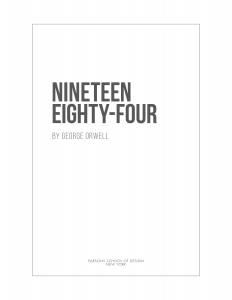
Having looked at them side by side, I think I may go with the version with the extra space between the title and the author. It’s a little less “designy” and seems like it would be better for a title page, whereas when the author is close, it seems more like a cover page.
A few weeks ago, I started a typography class at Parsons School of Design, part of the New School in Manhattan.
The book will be created from found letters we take photos of from our urban environment.
Here’s some of my progress so far. These are resized originals, because the originals had enormous pixel sizes.
I am way late to be posting this, but…hey, I got a developer scholarship! Last year, I saw a post on my local Girl Develop It Slack channel about scholarships being offered by Google and Udacity to US residents.
They have 2 tracks, Android developer and Web developer. Within each track there are 2 levels, beginner and intermediate. Out of (what I read was) 100,000 applications, I ended up getting one of 10,000 places in the intermediate-level, Mobile Web Specialist track.
A few others in GDI also got seats, for both tracks and levels. Google and Udacity also offer this same experience for residents of Europe, Russia, Egypt, Israel and Turkey.
The video-based courses are all on Udacity, and the instructor has so far been Jake Archibald, who is the supreme leader of all things Service Workers and Promises. In my opinion, the course is a little more advanced than intermediate, but maybe I just don’t understand JavaScript as well as other people. In any case, I’m glad to have this opportunity.
So far the course is structured around creating an “offline-first” experience, using Service Workers. What this means is when people are using your website or app, they will still be able to get content, even when they don’t have internet connectivity.
This happens because those apps and websites are using Service Workers, which intercept the connection between the app and the internet (the network). The service worker allows developers to create custom responses and other behaviors when there is no internet connectivity or when there is poor internet connectivity.
As mentioned above, the course covers service workers, the Fetch API, the Cache API, and IndexedDB using Jake Archibald’s Promised library. The course also covers Promises, which ties all this together. In addition, as I’ve read through the forums and discussions that the course designers have provided for us, I’ve come to realize that we are also learning about ES6 (ECMAScript 6) and Progressive Web Apps, which might just be another way of saying “offline first”.
There are some great resources I’ve found. First, I’ve again turned to Lynda to help me learn more about ES6. Although currently the Lynda ES6 course I chose to review is not as comprehensive as this class, but that’s OK. I’ve also had to spend extra time on YouTube learning about Promises, because these are not exactly intuitive if you don’t have too much experience with JavaScript. The goldmine I’ve found so far is the Progressive Web Apps course also offered by Google. After finding all of this information, especially Google’s information, I have more respect for how much Google values it’s technology, the robustness of their applications, and how much time they spend evangelizing technology and helping developers get better.
In addition to this course, I’ve also found another “Grow With Google” course. The Google IT Support Professional Certificate, which is accessed on Coursera.
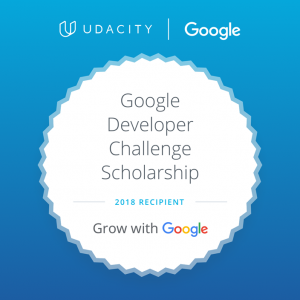
I haven’t discussed this course or this scholarship with people at work. I have misgivings about sharing this news. I guess I’m in a wait and see approach. Maybe if I move onto the nanodegree…or maybe not. I have until April to finish the course.